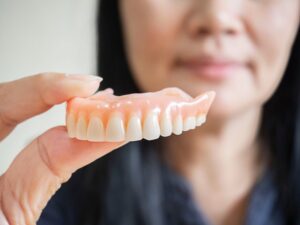
Dentures are a valuable solution for replacing missing teeth and restoring your smile. When they fit properly, they allow you to eat, speak, and smile with confidence. However, when dentures don’t fit the way they should, they can cause more harm than good. Ill-fitting dentures can lead to discomfort, health problems, and even affect your quality of life. Here are five common complications caused by poorly fitting dentures and why it’s important to address them sooner rather than later.
1. Sore Spots and Oral Sores
One of the first signs that your dentures don’t fit well is the development of sore spots or raw patches inside your mouth. As ill-fitting dentures rub against the gums or the soft tissues of the mouth, they create friction and pressure, leading to irritation. Over time, this can result in painful ulcers or sores that make it difficult to eat or talk. Left untreated, these sores can become infected, requiring medical attention.
2. Difficulty Chewing and Speaking
Dentures that shift or wobble can make everyday tasks like eating and speaking much more difficult. You may struggle to chew certain foods, avoid nutritious items that require more effort to eat, or find yourself slurring words due to instability. This can lead to nutritional deficiencies and reduced self-confidence, especially in social situations. Well-fitting dentures are essential for maintaining normal oral function.
3. Jawbone Loss
When dentures don’t fit properly, they may not distribute pressure evenly across the gums and jawbone. This can accelerate bone resorption, a natural process where the jawbone shrinks due to lack of stimulation. The more bone that is lost, the harder it becomes to get a good denture fit, creating a cycle of worsening fit and further bone loss. Regular adjustments or considering implant-supported dentures can help preserve your jawbone health.
4. Gum Inflammation and Infection
Constant rubbing and pressure from poor-fitting dentures can lead to inflammation of the gums, known as denture stomatitis. This condition may be accompanied by redness, swelling, and even fungal infections like oral thrush. It’s not only uncomfortable but also makes wearing dentures more painful. Good hygiene and a proper fit are key to preventing gum infections.
5. Changes in Facial Appearance
Ill-fitting dentures can fail to provide the support your facial muscles need. As a result, you may experience sagging cheeks, sunken lips, and a prematurely aged appearance. Over time, these changes can affect your confidence and how others perceive you. A well-fitted set of dentures helps maintain the natural shape of your face.
While dentures are a reliable and effective tooth replacement option, the fit makes all the difference. Ill-fitting dentures can cause a host of issues, from physical discomfort to bone loss and even facial changes. If you’re experiencing any of these problems, don’t wait. Schedule a visit with your dentist to have your dentures adjusted, relined, or replaced.
About the Practice
Are you looking to restore your looks and function with dentures, or having issues with your current prosthesis? Brown, Reynolds, Snow, LeNoir Dentistry has denture solutions to suit your particular needs. Our expert team of dentists and hygienists can place implant-supported dentures in-house; no need for a referral! We also offer regular full and partial dentures as well, and you can rest assured knowing that an award-winning care team is handling your case. If you’re ready to get your oral health back, schedule an appointment online or call one of our conveniently located offices in the Richmond area.
